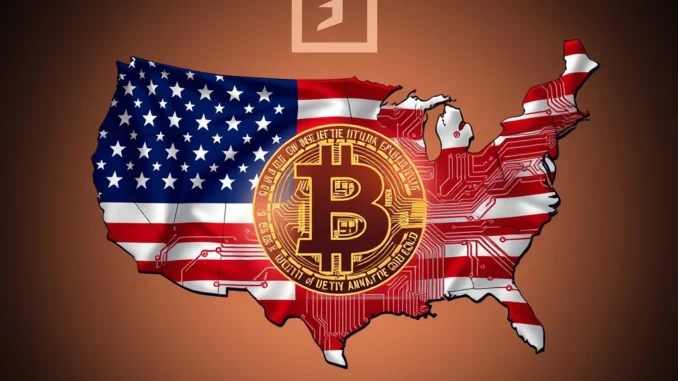
In a fascinating turn of events, traditional finance is increasingly acknowledging the power of digital assets. Germany’s financial giant, Deutsche Bank, has recently released a report highlighting the potential of Bitcoin as a strategic reserve for the United States. Could this be a game-changer for the U.S.’s position in the cryptocurrency world and its broader financial strategy? Let’s dive into Deutsche Bank’s insightful analysis and explore what this could mean for the future of finance.
Why Bitcoin Strategic Reserve Could Be a Masterstroke for US Crypto Leadership
Deutsche Bank’s report, as highlighted by The Crypto Basic, presents a compelling case for the U.S. to consider Bitcoin not just as a speculative asset, but as a crucial component of its strategic reserves. This isn’t just about hopping on the crypto bandwagon; it’s about making a calculated move to strengthen US crypto leadership on the global stage. But what exactly makes Bitcoin so strategically significant?
- Inflation Hedge in an Uncertain Economy: With inflation rates causing jitters worldwide and the value of the dollar facing potential depreciation, Bitcoin emerges as a compelling alternative. Unlike traditional currencies, Bitcoin’s finite supply (capped at 21 million coins) makes it inherently resistant to inflationary pressures. Think of it as digital gold – a scarce asset that can hold its value when fiat currencies falter.
- Demonstrating Confidence in the Future of Crypto: Imagine the signal the U.S. would send to the world by officially adding Bitcoin to its strategic reserves. It would be a powerful declaration of faith in the long-term viability and importance of cryptocurrency. This move could attract further investment, innovation, and talent to the U.S. crypto sector, solidifying its position as a leader.
- Setting a New Global Standard: Deutsche Bank draws a parallel to the 20th century when the U.S. gold reserve became a global benchmark. They suggest that a Bitcoin strategic reserve could similarly establish a new global standard in the digital age. This isn’t just about financial strategy; it’s about shaping the future of global finance.
The Power of a Bitcoin Strategic Reserve: More Than Just an Inflation Hedge
While acting as an inflation hedge is a significant benefit, the advantages of a Bitcoin strategic reserve extend far beyond just protecting against economic downturns. Let’s explore the multifaceted power this move could unleash:
| Benefit | Description |
|---|---|
| Economic Diversification | Reduces reliance on traditional assets and diversifies the national reserve portfolio. |
| Technological Innovation Hub | Positions the U.S. as a forward-thinking nation embracing cutting-edge financial technology, attracting innovators and businesses. |
| Geopolitical Influence | In a world increasingly influenced by digital assets, being a leader in crypto reserves could translate to geopolitical influence. |
| Financial Inclusion | Cryptocurrencies have the potential to enhance financial inclusion, and a supportive stance from the U.S. could promote broader adoption and access to financial services. |
Deutsche Bank’s Perspective: A Testament to Bitcoin’s Maturation
The endorsement from Deutsche Bank, a traditional financial institution with a long history, carries significant weight. It signals a growing acceptance of Bitcoin within mainstream finance. This isn’t just a fringe opinion; it’s a serious consideration from one of the world’s largest banks. Their analysis highlights Bitcoin’s evolution from a nascent technology to a mature asset class worthy of strategic consideration.
Consider these key takeaways from Deutsche Bank’s viewpoint:
- Legitimacy Boost: A positive assessment from Deutsche Bank adds further legitimacy to Bitcoin and the broader cryptocurrency market.
- Institutional Interest: Such reports can encourage other institutions and governments to explore the potential of Bitcoin as a reserve asset.
- Shift in Narrative: It contributes to shifting the narrative around Bitcoin from a purely speculative asset to a valuable strategic tool.
Challenges and Considerations for a US Bitcoin Reserve
While the potential benefits are compelling, implementing a Bitcoin strategic reserve for the U.S. is not without its challenges. Navigating regulatory hurdles, addressing volatility concerns, and ensuring secure storage are all crucial considerations. Furthermore, public perception and education around cryptocurrencies need to evolve to support such a bold move.
Key challenges include:
- Regulatory Framework: Clear and consistent regulations are needed to facilitate the acquisition, storage, and management of a Bitcoin reserve.
- Volatility Management: Bitcoin’s price volatility requires sophisticated risk management strategies to mitigate potential losses.
- Security and Custody: Ensuring the secure storage and custody of a significant Bitcoin reserve is paramount to prevent theft or loss.
- Public Education: Addressing public misconceptions and promoting education about cryptocurrencies is essential for broader acceptance and support.
Actionable Insights: What Does This Mean for Crypto Enthusiasts and Investors?
For those already invested in or interested in cryptocurrencies, Deutsche Bank’s report is another strong validation of Bitcoin’s long-term potential. It suggests that institutional adoption is not just a possibility but a growing likelihood. This could translate to increased demand, price appreciation, and further maturation of the crypto market.
Here are some actionable insights:
- Stay Informed: Keep abreast of developments regarding regulatory frameworks and institutional adoption of cryptocurrencies.
- Long-Term Perspective: View Bitcoin and other cryptocurrencies with a long-term investment horizon, recognizing their potential as strategic assets.
- Diversification: Consider diversifying your investment portfolio to include cryptocurrencies as part of a broader strategy.
Conclusion: A Powerful Signal for the Future of Finance
Deutsche Bank’s assessment of Bitcoin as a potential strategic reserve for the U.S. is a significant development. It underscores the growing recognition of cryptocurrency’s role in the global financial landscape. By embracing Bitcoin, the U.S. has the opportunity to not only hedge against economic uncertainties but also to solidify its position as a leader in the burgeoning crypto revolution. This bold step could indeed set a new precedent, echoing the historical significance of the U.S. gold reserve and ushering in a new era of digital finance. The message is clear: Bitcoin is no longer on the fringes; it’s moving towards the center of global financial strategy, and its potential to strengthen US crypto leadership is undeniable.



